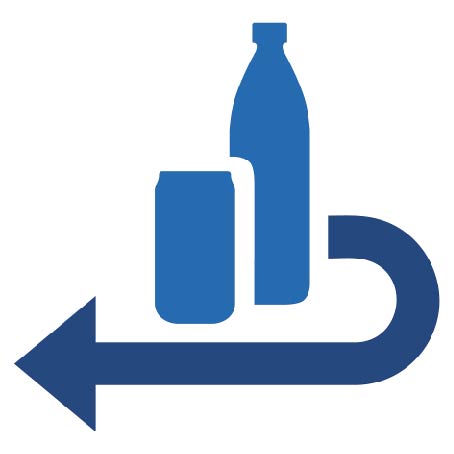The law surrounding the deposit obligation for single-use beverage packaging
The deposit obligation has been gradually expanded since January 2022 to include various milk drinks, alcoholic beverages such as sparkling wine and wine, mixed beverages containing alcohol, fruit and vegetable juices, and non-carbonated nectars in single-use plastic beverage bottles or beverage cans.
No matter what type of packaging you use to distribute your goods, you have to be registered with the LUCID Packaging Register and indicate which packaging types are distributed under what brand names. That also applies to goods in single-use beverage packaging subject to deposit.
Milk and dairy drinks as well as other drinkable dairy products
Single-use plastic beverage bottles for the following milk drinks in quantities between 0.1 and 3 litres have been subject to deposit since 1 January 2024:
Milk and dairy drinks with at least 50 percent milk content or
Other drinkable dairy products as set out in section 2 of the Milk and Margarine Act (MilchMargG), especially yoghurt and kefir
Sparkling wine, wine, sparkling wine- and wine-based cocktails, beverages and mixed beverages similar to wine, alcohol products and mixed beverages containing alcohol, fruit and vegetable juices, non-carbonated fruit and vegetable nectars
For beverages from the mentioned product areas, the first stage of the extended deposit obligation for single-use beverage packaging entered into force on 1 January 2022. Certain single-use packaging for these beverages has been subject to deposit since then. The first stage also concerned beverage cans filled with
milk and dairy drinks as well as other drinkable dairy products and
dietary beverages for infants or toddlers.
Exemptions from the deposit obligation
Certain single-use beverage packaging ...
is expressly exempt from the deposit obligation due to its volume. The exemption applies to packaging with a volume of less than 0.1 and more than 3.0 litres.
is expressly exempt from the deposit obligation due to its design. Exemptions apply exhaustively to square, gable-top or cylindrical beverage cartons, or tubular bags for beverages made from polyethylene, or foil stand-up pouches.
is expressly exempt from the deposit obligation due to its contents (cf. section 31 (4) no. 7 VerpackG (Packaging Act)), with beverage cans always being subject to deposit regardless of their contents. The same applies to single-use plastic bottles for beverages with a few exceptions.
for which it can be documented that its sole purpose is to be handed over to final consumers outside of Germany (exports).
Participating your single-use beverage packaging in the German deposit scheme ('DPG')
Registering with the LUCID Packaging Register is not enough. You must also participate your single-use beverage packaging in the DPG deposit scheme.
For more information about the deposit obligation, please visit the DPG website.
DPG provides an overview of which single-use beverage packaging is subject to the deposit obligation.

